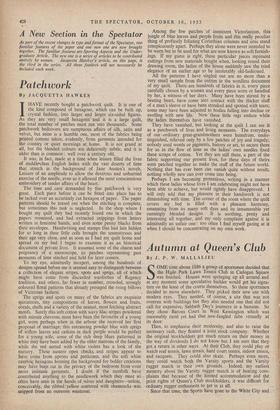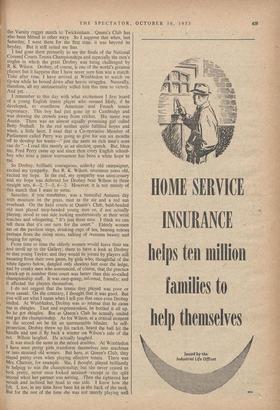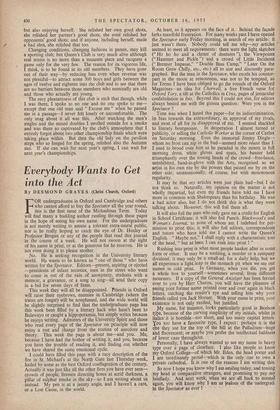Autumn at Queen's Club
By J. P. W. MALLALIEU SOME time about 1886 a_ group of sportsmen decided that, the. Hyde Park Lawn. Tennis Club in Cadogan Square was finished. Houses were springing up all around. and at any moment some speculative builder would get his signa- ture on the lease of the courts themselves. So these sportsmen decided to move elsewhere. They picked their new site with modern eyes. They needed, of course, a site that was not overrun with buildings but they also needed one that did not call for expensive, Sabbath Day's journeys in a hansom. So they chose Barons Court in West Kensington which was reasonably rural yet had that new-fangled tube virtually at its door.
Then, to emphasise their modernity, and also to raise the necessary cash, they floated a joint stock company. Whether the original 'stockholders got much return on their money in the way of dividends I do not know -but I am sure that they got a return in other ways. At their Club, they could play or watch' real tennis, lawn tennis, hard court tennis, indoor tennis, and racquets. They could also skate. Perhaps even more, they could 'watch both the Varsity sports and the Varsity rugger match in their own grounds. Indeed, my earliest memory about the Varsity rugger match is of hearing com- plaints that because of the limited accommodation and the prior rights of Queen's Club stockholders, it was difficult for ordinary rugger enthusiasts to get in at all. Since that time, the Sports'have gone to the White City, and 14 the Varsity rugger match to Twickenham. Queen's Club has also been blitzed in other ways. So I suppose that when, last Saturday, I went there for the first time, it was beyond its heyday. But it still suited me fine.
I had gone there primarily to see the finals of the National -Covered Courts Tennis Championships and especially the men's singles in which the great Drobny was being challenged by R. K. Wilson. Drobny, of course, is one of the world's greatest players but it happens that I have never seen him win a match: Time after time, I have arrived at Wimbledon to watch on tip-toe while he bowed down after heroic struggles. Naturally, therefore, all my sentimentality willed him this time to victory. And yet. . . .
I remember to this day with what excitement I first heard of a young English tennis player who seemed likely, if he developed, to overthrow American and French tennis supremacy. This boy had just gone up to Cambridge and was • drawing the crowds away from cricket. His name was Austin. There was an almost equally promising girl called Betty Nuthall. In the end • neither quite fulfilled hopes and -= when, a little later, I read that a Co-operative Member of Parliament called Perry was going to give his son six months j '- off to develop his tennis—" just the same as rich men's sons can-do "—I read this merely as an election, speech. But, bless me, Fred Perry came up and since then every English school- , boy who wins a junior tournament has been a white hope' to me.
So Drobny, brilliant, courageous, unlucky old campaigner, excited my sympathy. But R. K. Wilson, seventeen years old, excited my hope. In the end, my sympathy was unnecessary and my hope was deferred for Drobny beat Wilson in three straight sets, 6-2, 7-5, 6-2. However, it is not mainly of this match that I want to write.
Saturday, if you remember, was a beautiful Autumn day with moisture on the grass, mist in the air and a red sun overhead. On the hard courts at Queen's Club, bald-headed old men played mop-headed young men or, if not actually playing, stood to one side looking unobtrusively at their wrist watches and whispering, " It's just three now. I think we can tell them that it's our turn for the court." Elderly women sat on the pavilion steps, drinking cups of tea, hearing echoes perhaps from the rising mists, talking of Autumn beauty and longing for spring.
From time to time the elderly women would leave their tea and stroll up to the Gallery, there to have a look at Drobny or that young Taylor; and they would be joined by players still sweating from their own game, by girls who, thoughtful of the white figures below, dangled only shoeless feet over the ledge, and by creaky men who announced, of course, that. the practice knock-up in number three court was better than this so-called championship stuff. It was easy-going, informal, friendly; and it affected the players themselves. I do not suggest that the tennis they played was poor or even casual. On the contrary, I thought that it was good. But you will see what I mean when I tell you that once even Drobny smiled. At Wimbledon, Drobny was so intense that he came out in shingles. Taut and expressionless, he bottled it all up. So he got shingles. But at Quee,n's Club he actually smiled and got the championship. As for Wilson, at a critical moment in the second set he hit an unreturnable blinder. In self- protection, Drobny threw up his racket, heard the ball hit the handle and saw it fly back a winner on Wilson's side of the net. Wilson laughed. He actually laughed.
It was much the same in the mixed doubles. At Wimbledon I have seen pretty girls transform themselves into machines or into strained old women. But here, at Queen's Club, they stayed pretty even when playing effective tennis. There was Mrs. Chatrier, for example. She, I thought, played brilliantly in helping to win the championship, but she never ceased to look pretty, never once looked strained—except in the split second when her partner, was serving. Then she tightened her mouth and inclined her head to one side. I know how she felt. I, too, in my time have been hit in -the back of the neck. But for the rest of the time she was not merely playing well but also enjoying herself. She relished her own good shots, she relished her partner's good shots, she eved• relished her opponents' good shots; and if anyone, including herself, made a bad shot, she relished that too.
Changing conditions, changing fashions in games, may kill a sporting club; but Queen's Club is very much alive although real tennis is no more than a museum piece and racquets a game only for the very few. The reason for its vigorous life, I think, is to be found in its old members. They have gone out of their way—by reducing fees even when revenue was not plentiful—to attract some 300 boys and girls between the ages of twelve and eighteen into the club and to see that there are no barriers between those members who nominally are old and those who actually are young. The easy pleasantness of this club is such that though, while I was there, I spoke to no one and no one spoke to me— except that one old man said " Excuse me " when he passed me in a passage—I never felt lonely or uncomfortable. The only snag about it all was this. After watching the men's singles and the mixed doubles I strolled outside for a smoke and was there so captivated by the club's atmosphere that I entirely forgot about two other championship finals which were taking place within. But then the old lady on the pavilion steps who so longed for the spring, relished also the Autumn sun. If she can wait for next year's spring, I can wait for next year's championships.




































 Previous page
Previous page